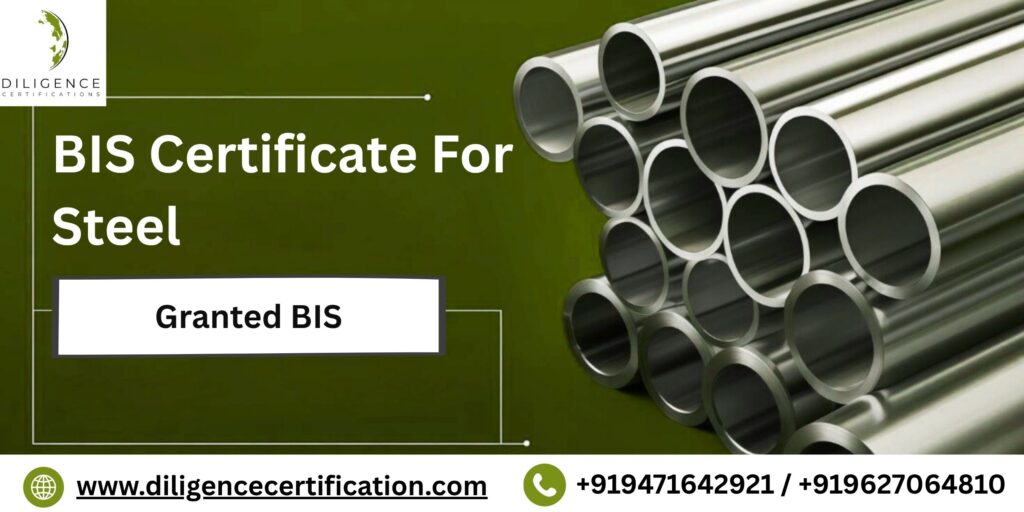BIS Certificate for Steel Products
- BIS certificate is required in India to sell/import/manufacture steel-related products under an enforced code issued by the Bureau of Indian Standards.
- The Memories steel products comply with the minimum level of safety, strength, and durability as mandated by law in India.
- BIS Quality Control Orders (QCO) have strict enforcement requirements; customs will not clear products that do not have a BIS certificate.
- The major product categories include TMT bars; structural steel; stainless steel sheets; steel pipes; pressure vessel plates; galvanized steel; and many others.
- The certification process includes lab testing; factory audit; document verification; and surveillance after certification.
- A BIS licence is valid for 24 months and must be renewed before lapse or risk to your business and legal liabilities.
Introduction:

A BIS certificate for steel means your product complies to India’s level of safety and compliance. In the absence of one, you cannot legally sell, import or supply steel products that are covered under QCO rules. When it comes to TMT bars, structural steel, stainless steel sheets, and other critical products that might be covered under enforceable QCO rules, there is little doubt that if you will be relying on steel to complete critical construction projects, you want steel material that you can rely on and trust.
A failure to comply can result in delayed shipments, fines, or a loss of orders. Getting BIS certificate isn’t just a smart business decision, it’s a decision you have to make as a supplier of steel products.
What is a BIS Certificate for Steel?
Put simply, the BIS certification for steel is the government’s way of confirming that your steel is an acceptable minimum specification for safety, durability, and performance.
This falls under the Bureau of Indian Standards Act, 2016 and is enforced further by QCO notifications published by the Ministry of Steel and Ministry of Consumer Affairs.
Why is BIS Certification for Steel Compulsory?

Steel is the backbone of Indian infrastructure – from bridges, railways, buildings, defence, oil & gas, shipbuilding, etc. If poor quality or substandard steel makes it into the marketplace, the effect could be deadly.
Hence BIS certification ensures:
- The right tensile and yield strength
- Proper chemical composition
- Verified corrosion resistance
- Consistent dimensions and tolerances
From an industry view, it also cuts down fraud and grey-market imports, which is why BIS Certificate is non-negotiable if you want to move large volumes of steel in India.
Which Steel Products Need a BIS Certificate?
According to BIS guidelines and the QCO, these steel categories (not limited to) require compulsory certification:
- Mild steel reinforcement bars (IS 1786)
- Hot rolled structural steel (IS 2062)
- Carbon steel billets and blooms (IS 2830)
- Stainless steel plates, sheets, strips (IS 5522, IS 6911)
- Pressure vessel steel (IS 2002, IS 2041)
- Galvanized steel sheets (IS 277)
- Fusion-bonded epoxy coated bars (IS 13620)
- Stainless steel wire rods (IS 6527)
- Steel tubes and pipes (IS 1161, IS 1239)
BIS Indian Standards (IS Codes) List for Steel
Since you asked to cover the detailed IS codes, here is a structured, ready-to-use list:
- IS 2062 – Hot rolled medium/high tensile structural steel
- IS 1786 – High strength deformed steel bars
- IS 2830 – Carbon steel cast billet ingots
- IS 5522 – Stainless steel for utensils
- IS 6911 – Stainless steel plate, sheet and strip
- IS 277 – Galvanized steel sheets
- IS 2002 – Steel plates for pressure vessels
- IS 2041 – Pressure vessel steels for moderate/low temperature
- IS 13620 – Fusion bonded epoxy-coated steel
- IS 1161 – Steel tubes for structural use
- IS 1239 (Part 1) – Steel tubes
- IS 6527 – Stainless steel wire rod
(You can refer to the 150+ IS codes you posted, which I can also help format into a downloadable table for your site if you wish.)
The BIS Certificate Process for Steel, Step by Step
Step 1 – Define Your Product Scope
Don’t blindly apply. First, match your product with the correct IS code (for example IS 1786 for TMT bars).
Step 2 – File the BIS Application
Register on the BIS portal. Fill in factory details, capacity, quality plan, and upload relevant declarations.
Step 3 – Get Your Sample Tested
Send product samples to a BIS Certificate-recognized lab for testing. They will check mechanical, chemical, and physical properties.
Step 4 – Factory Audit
BIS inspectors will do an on-site inspection of your facility, verifying your test labs, raw material tracking, traceability, and process controls.
Step 5 – Grant of BIS Licence
If everything passes, you receive a unique CM/L (Certification Mark Licence) number, which is valid for 2 years.
Step 6 – Ongoing Surveillance
Every 6–12 months, BIS may re-check samples or do surprise audits.

Documents Required for BIS Steel Certification
Be ready with these documents to avoid delays:
- Factory license
- GST certificate
- PAN card
- Manufacturing process flowchart
- Quality manual
- Test equipment list
- Previous customer orders
- IS code–specific data sheets
- Product photographs
Cost Structure for BIS Certification for Steel
| Application Fee | One-time government fee for submitting the BIS certification application. |
| Product Testing Charges | Charges for testing steel products in BIS-recognized laboratories. |
| Inspection Fee | Fee for BIS officials to conduct factory inspection and verification. |
| Marking Fee | Annual fee paid to BIS for use of ISI Mark on steel products. |
| Consultancy Fee | Professional charges for handling documentation, filing, and coordination. |
Timelines
- With no mistakes: 60–90 days
- With clarifications: 90–120 days
- For major product scope expansions: even longer
Reasons Why BIS Licence Applications Fail
Consistency across Batches
Many mills test one batch but change their chemistry later, which fails random audits.
Wrong IS Codes
Applying under the wrong IS code is the #1 reason for rejection. Always match your product precisely.
Fake Lab Reports
A few shady consultants submit fake reports. If BIS catches you, your licence will be blacklisted for years.
Benefits of BIS Certificate for Steel
Obtaining a BIS Certificate for steel is not just a regulatory necessity—it’s a mark of trust, performance, and safety. Here are the key benefits of getting BIS certified:
Ensures Compliance with BIS Steel Standards
All steel manufacturers and importers must comply with BIS steel standards, including IS standards such as IS 2062 (hot-rolled steel) and IS 1786 (TMT bars). BIS certification certifies the steel is at a level of quality and safety in India.
Mandatory for Import to India
Once the Foreign manufacturers depend upon the BIS Certificate requirement for import of steel, all Foreign manufacturers are required to get BIS certification based on the Foreign Manufacturers Certification Scheme (FMCS)-, to ensure that the imported steel has been manufactured to Indian safety and quality standards.
Avoid legal penalties and seizures
Failure to comply with BIS safety standards in imported steel could lead to action against you, seizure of goods and penalties. So, having BIS certificate will ensure you protect your business risks and confirm you will have smooth clearance at customs checking your goods.
Increases your avenues for export potential
Indian manufacturers with BIS-certified steel are better positioned to meet global quality demands, helping expand to international markets with recognized quality assurance.
One of my clients from Jamshedpur was exporting high-strength steel plates to the Gulf. They didn’t realise that Indian customs still demand BIS even for export-bonded material.
We helped them get their IS 2002 certification on priority. Their shipment cleared port just 2 days before the buyer’s letter of credit deadline, saving nearly ₹12 crore in penalties and contract default.
That’s the difference a BIS Certificate expert can make.
Renewal of BIS Steel Certification
Your BIS licence needs renewal every 2 years. You must:
- Provide fresh test results
- Show consistent product quality
- Pass a new factory inspection if your scope has changed
Never leave this to the last minute, or your licence can get suspended.
Requirements for BIS Certificate for Steel
To obtain a BIS Certificate for steel, the following documents and steps are typically required:
Product Standards Reference
You must identify the applicable Indian Standard (IS code) for the specific steel product. For instance:
- IS 2062 – Hot Rolled Low, Medium, and High Tensile Structural Steel
- IS 1786 – High Strength Deformed Steel Bars
- IS 2830 – Carbon Steel Billets
Factory Inspection
BIS Certificate & verified officers will make an in-depth inspection of the manufacturing unit, of the manufacturing unit’s testing facilities and quality assurance processes to guarantee compliance with BIS safety standards at the import location in India.
Products Testing
BIS Certificate will test the sample steel in an independent BIS Certificate Recognized Laboratory to ensure compliance with the relevant Indian Standard.
Technical Documentation
Manufacturers must submit:
- Factory layout and process flow
- Quality control manual
- Raw material details
- Test reports
- Manufacturing license or registration
Marking and Labelling
Certified products must carry the Standard Mark (ISI Mark) along with license number and IS standard number.
Eligibility Criteria for BIS Certificate for Steel
Not every applicant is eligible to apply for BIS Certificate unless all inscriptions that have certain eligible norms. Below are the minimum eligibility criteria:
Manufacturers Only
Only manufacturers—not traders or agents—can apply for the BIS Certificate for steel under the Bureau of Indian Standards Act.
Fully Operational Production Unit
The manufacturing unit must be operational and have the required production capacity and testing infrastructure to meet BIS Certificate norms.
Compliance with Indian Standards
The product must strictly conform to the relevant BIS steel standards. Any deviation from chemical composition, tensile strength, or dimensional tolerance can lead to rejection.
Quality Control System
The applicant must have an effective quality control system in place to continuously ensure the product meets BIS Certificate safety parameters.
For Importers: FMCS Route
Foreign manufacturers must apply under the Foreign Manufacturers Certification Scheme (FMCS). This includes appointing an Authorized Indian Representative (AIR) and undergoing inspection by Indian BIS officials abroad.
BIS Steel Certification and International Markets
- Some manufacturers think, “I already have ISO or CE, why BIS?”
- ISO/CE are great, but Indian law demands BIS certification on top of those. Otherwise, your shipment will get stuck.
- If you want to sell globally, a BIS-certified product also gives you a quality baseline to pass foreign certifications faster.
Conclusion
In 2025, ignoring BIS is a recipe for disaster. Whether you’re making TMT bars, stainless kitchen plates, or shipbuilding sections, bis certificate for steel is your legal and commercial passport.
If you want peace of mind, get your BIS process started early — and reach out to an expert who can help you navigate every audit, test, and document.
Need help securing your BIS certificate for steel? Contact our compliance advisors today and stay worry-free. Diligence Certification Guide
Why Choose Diligence Certifications for BIS Certificate for Steel?
Expertise in BIS Steel Standards
Diligence Certifications is a trusted name in BIS compliance consulting. We specialize in Indian Standard Codes like IS 2062, IS 1786, IS 2830, and more.
End-to-End Guidance
From application to approval, our team handles every step of your BIS registration journey. Whether you’re a domestic steel manufacturer or a foreign exporter looking to meet the BIS requirement for import of steel, we’ve got you covered.
Quick Turnaround Time
With direct coordination with BIS authorities, our experts ensure faster approval of your BIS Certificate for steel without unnecessary delays.
Dedicated Compliance Team
Our compliance specialists stay updated with the latest amendments in BIS safety standards and ensure your certification process remains hassle-free and audit-ready.
Global Clientele Support
Whether you’re exporting steel to India or manufacturing locally, Diligence Certifications supports clients from over 30+ countries with FMCS, CRS, and ISI mark registration.
Frequently Asked Questions
Is BIS Certificate mandatory for all steel?
Not every single grade, but if your product falls under notified IS codes in the QCO, then yes, BIS Certificate is mandatory.
How long is BIS Certificate valid?
Two years, with renewal.
Can I apply for BIS Certificate on my own?
Yes, but many clients use a consultant to speed things up.
Is ISO enough instead of BIS Certificate?
No, Indian law needs BIS even if you have ISO or CE.
Can I renew BIS Certificate online?
Yes, via the BIS Certificate online portal, provided you have valid documents and fresh test reports.
What happens if my BIS certificate for steel expires?
If your BIS certificate expires, you can’t legally sell, ship, or export steel. Customs may block shipments, and you’ll need to renew to resume business.
Can foreign steel manufacturers get BIS certificate?
Yes. Foreign manufacturers can apply under BIS’s FMCS scheme, but they must appoint an Indian representative and meet all Indian Standard (IS) requirements.
How many products can one BIS Certificate license cover?
A single BIS Certificate licence can cover multiple steel products only if they follow the same IS code and have identical specs. Different grades or types need separate licences.
Does BIS certificate include environmental checks?
BIS mainly focuses on product quality and safety. But some IS codes set limits on hazardous substances like lead or cadmium to ensure environmental compliance.
Can I transfer my BIS certificate to a new factory?
No. BIS certificates are linked to a specific factory address. If you change your plant location, a new audit and licence are required.








 BIS Certification
BIS Certification
 CDSCO
CDSCO
 CPCB
CPCB
 LMPC
LMPC
 WPC Approval
WPC Approval
 Global Approvals
Global Approvals
 TEC
TEC
 ARAI
ARAI
 BEE
BEE
 ISO Certification
ISO Certification
 Drone Registration
Drone Registration
 NOC For Steel
NOC For Steel



















 Business Registration
Business Registration














 Legal Services
Legal Services
 Trademark Registration
Trademark Registration
 Copyright Registration
Copyright Registration
 Patent Registration
Patent Registration
















































